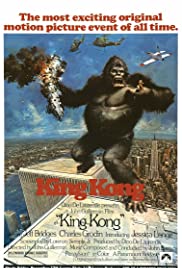
KING KONG
US, 1976, 128 minutes, Colour.
Jeff Bridges, Jessica Lange, Charles Grodin, John Randolph, Rene Auberjonois.
Directed by John Guillerman
The problem for King Kong: how to re-make a classic which used models and clever photography? In the 1970s, the answer was big budget engineering to make a gigantic Kong - who certainly does look a live being. Updated situations provide strong material for jibes at unscrupulous big business, but, once again, it is the power of the mysterious Kong, the Beast, being fascinated by the Beauty (some excellent touches here) and his being, destroyed by brutal humans (rushed violence in comparison with the development of the first part of the film).
Jessica Lange looks like so many actress-models of the time but soon began a long career, winning two Oscars for Tootsie and Blue Sky. Charles Grodin is excellent as the exploiter and Jeff Bridges a genial hero. But it is Kong who makes the impression.
1. How enjoyable this spectacle? The nature of its spectacle, the success of its technical achievement? The seventies presentation of myths? Application of myths to modern times?
2. Comment on the technical achievement of the film: the use of Panavision and colour, isle of locations, New York sets, the presentation of Kong himself?
3. Comment on the impact of King Kong and his presence, the knowledge of the construction of Kong, the mechanical presentation of him? The island sequences, the ship, New York and its destruction? The engineering achievement in this presentation of King Kong?
4. What were the qualities of this particular film? Audience
expectations of a re-make of a classic? Did the film stand well with the original? Contrasts, differences, similarities?
5. How credible is the plot? A mixture of fantasy and reality? Does it seem credible? The interests and the preoccupations of the seventies, oil exploration, big business, stardom in the movies, etc.? The interest in spectacle, the interest in myths? The melodramatics of the ending?
6. Comment on the mythical background of the film: the 'Beauty and the Beast' theme and the references to it? The beast aspects of the myth: the beast as huge, as terrifying, as a God, as the object of superstition, to be appeased, the marriage ceremony? The attractive aspects of the beast? The mythical stories, their personality, destruction and love? Comment on the mythical aspects of the Beauty: a modern American, was she worth all this consideration? A screaming beauty, a fearful beauty? Changed by her King Kong experience with the Beast? The mythical values also of the search, the fog, the mysterious island and its inhabitants, its transforming power, its mountains, the moon, etc.? How well integrated in the plot were all these mythical elements?
7. The theme of beauty changing the beast? The visualising of the humanising of Kong? How did the film invest Kong with personality? The close-ups of his face, eyes, hands, holding Dwan, his footprints and his movement? How human did Kong become? How humane?
8. The theme of brutality versus reason? The savage aspects of Kong changing to love and protection, fear turning to love? The brutality of human exploitation and destruction? How were the humans brutal? How was the beast reasonable?
9. How important was the character of Dwan? Her shipwreck, the irony of her being, rescued, the men's response to her, her seeing herself as a loser, her love for Jack, her interest in the exploration, the encounter with Kong, her fears, changing to compassion, her returning to America and her attitude towards Kong, her wanting to be a star, her change and horror at people's exploitation, even the parody of her marriage ceremony, her grief at Kong's death? A heroine and princess for this kind of film?
10. How credible was Jack as hero? His being on the ship, the anthropologist and non-exploitive type, his saving of Dwan, his love for her, his joining in the exploration, his wanting to rescue her, the dangers that he encountered in the exploration and search for Dwan, his trying to tell her the truth, his presence at the circus, his rescuing Dwan, his sorrow at Kong's death? A credible hero?
11. The executive as villain? Ambitions, self-satisfaction, complacent, plans for the oil exploration, forcing the ship on its way in storms, callous, not wanting to rescue people, thinking of money only and his reputation? His exploitation of Kong, the capture, the voyage back to America, his compering the show, the inevitability of his death? How incisive was the satire and parody in this characterisation?
12. The presentation of the crew, the captain, the assistants on research: the world of oil exploration, modern shipping, exploration on the island, observation of the natives and of animals? The crew's involvement in the rescue, their deaths over the canyon, the capturing of Kong and the details of the voyage back to New York?
13. The atmosphere of spectacle in the film: the huge ship. the island in fog, the native customs, the wedding with Kong and Dwan's participation in it, the atmosphere of religious and superstitious ceremony, Kong's killing of the sailors, the encounter with the prehistoric snake and the fight, the way that he was captured, breaking through the fort, the voyage back in the hold of the ship, his threatening to break the ship, the fanfare of his being exhibited, the spectacle of his escape and destruction of New York?
14. The theme of the encounter between man and beast? Man's fear of the beast, especially in the ship, and the violence of Kong's attack and his death?
15. Did the film build well to the climax: the memory of the lost island in the canyons of New York, the violence of the flame throwers, the helicopters and the shooting, Kong's defending himself and audience sympathy for this? Dwan's involvement, the pathos of his death?
16. The value of this kind of cinema entertainment and the visualisation of myths in modern form? For him to come back?